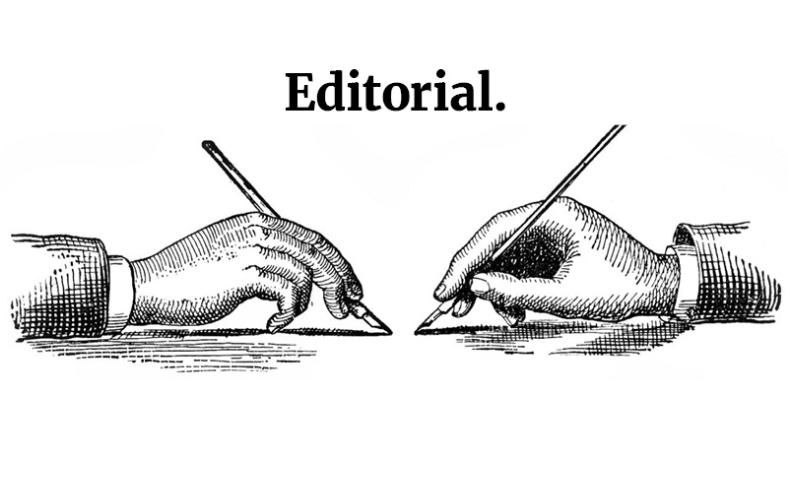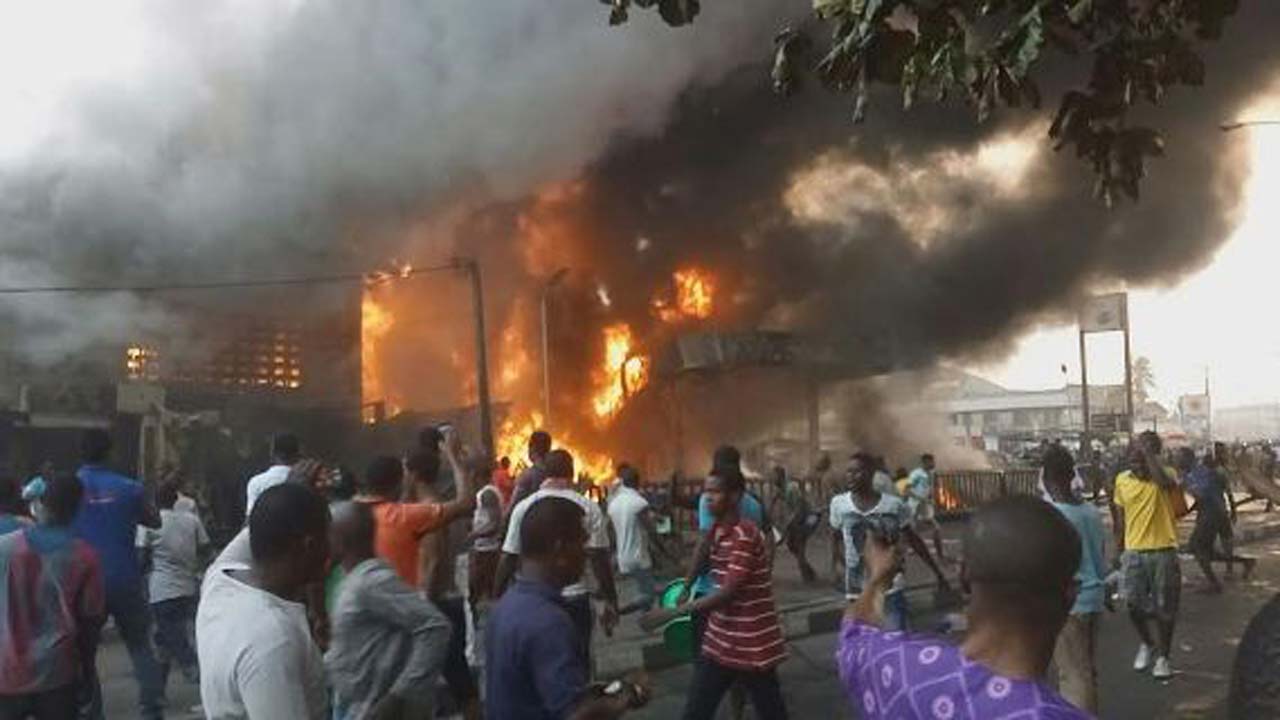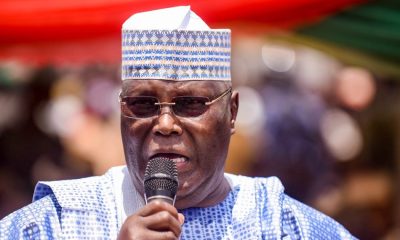EDITORIAL
Kaduna Gas Explosion

Tragedy struck Kaduna, capital of Kaduna state, when a gas explosion that occurred at the city, January 4, killed the Chairman of Nigeria’s Atomic Energy Commission, Prof. Simon P. Mallam, his son and several others. The nation’s Atomic Energy Chairman/Chief Executive ironically met his tragic demise in an explosion at Sabo Tasha in southern end of Kaduna.
Prof.
Simon P. Mallam, a renowned Nuclear Physicist from Kaura local Government in the Southern part of the State was until his death a Fellow, Nigeria Institute of Physics (2007) . The late Nigeria’s Atomic Energy Chairman had carried out researches in several areas and published numerous articles and journals. His researches were in the fields of Radiation and Nuclear Techniques in Biophysics, Medical Physics, Environment and Radiation Effects and Radiation and Nuclear Safety and Radioactive Waste Management. He had served in many technical advisory committees both at the university, national and international levels. He was the national coordinator of efforts at entrenching a radioactive waste management regime in the country.The nation has been mourning the tragic demise of the National Energy Commission Chairman, his son and several others who were killed in the explosion which took place in a residential area. President Muhammadu Buhari in his statement over the tragic incident said the death of the erudite scholar has robbed the nation of a great scientist, whose services, were greatly needed at a time the nation was increasing emphasis on science and technology. The Northern Governors’ Forum equally commiserated with the government and people of Kaduna State over the Sabon Tasha tragedy.
In his condolence message issued in Jos, the Chairman of the Forum and Governor of Plateau, Simon Lalong, described the deaths in Kaduna as painful and unfortunate. He described the death of Professor Mallam in particular as a huge loss to the entire people of the Northern Region,as well as a blow to the immediate family of the deceased and Nigeria as a whole.
Gov. Lalong said the death of Prof. Mallam would cause a major setback to Nigeria’s quest for energy sufficiency given his vast knowledge and experience which he had been deploying as the Chairman of the Energy Commission.
The Forum, equally called for stringent supervision of gas handling in Nigeria to forestall future occurrences. The people of Kaduna under the auspices of Southern Kaduna Peoples Union (SOKAPU) equally mourned Prof. Simon P. Mallam and five other persons who died in the gas explosion.SOKAPU President, Jonathan Asake, in a statement condoled with the families of the victims and called on the government and other relevant regulatory agencies to enforce safety regulations for life threatening businesses such as gas outlets and petrol stations that are situated in residential areas to avoid future recurrence of avoidable loss of precious lives. SOKAPU described as very painful the exit of Prof. Mallam, whom it described as a rare gem, a great icon and an illustrious son of Southern Kaduna .
On its part, the Department of Petroleum Resources (DPR) said preliminary investigations into the incident have that the cause of the Kaduna gas explosion was as a result of illegal decanting (transfer) of liquefied petroleum gas, LPG, into another cylinder by operators of the facility.Mr Paul Osu, head, public affairs of the agency said in line with “our regulatory oversight on the oil and gas industry, the agency immediately mobilised our staff to the scene to investigate the cause of the explosion and promised to carry out further investigations on the incident, and will continue to monitor and sensitise members of the public on safe handling of petroleum products to prevent the occurrence of incidences.
We wish to commend the DPR and Kaduna state government for measures being taken to forestall similar occurrences in future and to ensure the safety of the products. They should however, take more proactive steps against those doing gas and inflammable businesses within residential areas to relocate them to avert loss of lives and properties. Meanwhile , we wish to join the rest of Nigerians to commiserate with the families of the Atomic Energy Commission Chairman, and the rest that lost their lives in the last Saturday Kaduna gas tragedy.
| ReplyReply allForward |
EDITORIAL
Livestock Ministry: Antidote to Herders-Farmers Clashes

The Federal Government of Nigeria took a significant step to curb recurring violent clashes between cattle herders and farmers with the establishment of the Ministry of Livestock Development in July 2024. Aside from the mandate to work out a pragmatic framework to address and curtail herders- farmers’ violent clashes, it is also mandated to implement very important aspects of livestock developments to stimulate and accelerate protein and nutritional value as well as guarantee food security.
Although livestock development was hitherto a department under the Ministry of Agriculture, its establishment to a full-fledged ministry is a deliberate design to boost and unlock those hidden economic and socio-political potentials in the sector.President Bola Tinubu, during the establishment of the ministry charged its management team, led by Alhaji Miktar Idi Maiha to drive a new era of transformation, innovation, and sustainable growth in the livestock sector.In line with its vision, the ministry has already developed a 15-year investment plan, known as the National Livestock Master Plan (NLMP), to transform the country’s livestock sector to accelerate food security, rural prosperity, and national economic growth.With the determination to achieve its desired goal, the ministry has forged strategic partnerships with international investors, agencies, and diplomatic missions to secure technical expertise, financing and investment in the livestock industry. Already, it has forged partnerships with Brazil, China, the Czech Republic, Denmark, Egypt, Mexico, Morocco, Saudi Arabia, Sweden, the United Kingdom, and the United States.The ministry is also addressing challenges of poor infrastructure affecting the ranching of animals and revamping of grazing reserves nationwide, equipping them with feed and fodder facilities, water resources, veterinary services, and schools for pastoral families.These initiatives are aimed to increase the livestock sector’s contribution to the country’s GDP from 5% to 10% by 2030. This will no doubt create millions of jobs and produce sufficient meat, dairy, and other animal products to meet domestic demand and compete in the global market.In particular, the ministry plans to generate over 500,000 new jobs to reduce unemployment and drive rural economic growth beginning from 2027.All of these demonstrate the government’s commitment to repositioning the livestock ministry to unlock the sector’s potential for economic growth and development.For instance, the ministry plans to partner local and international vehicle assembly plants to design and market specially built vehicles suitable for safety transportation of animals, be they large or small and birds, without compromising their nutritional value in line with international best practices.Alhaji Miktar Idi Maiha, Minister in charge of the ministry had assured the nation that the ministry would evolve modern techniques of animal husbandry in educating and enlightening the nomadic pastoralists who constantly move about with their cattle – a source of friction with farmers – to embrace the ranching of their cattle. Although he acknowledged the herculean task ahead, he expressed optimism and determination of the government to achieve the desired goals within a plausible short time for the overall good of the country.DAILY ASSET is in total support of this laudable initiative. The world is advancing technologically by evolving new techniques of doing things. Nigeria’s pastoralists cannot cannot be left in the era of the stone age of roaming about with cattle in the name of tradition that is out of reality with modern times.Government’s deliberate push for establishment of animal ranches, which invariably would transform to establishments of better abattoirs, veterinary and conventional clinics, cottage industries for meat processing, hides and skins, et al. Nigeria will make a quantum reap not just in taming the herders and farmers violent clashes with attendant toll on human lives and property but the multiplier effect of economic growth, job creation and better protein diet would be achieved.Attaining these lofty goals requires pragmatic political will by the government through adequate funding of the young ministry to enable it implement sensitisation programs together with the core objectives lined up for the overall transformation of the livestock sector.EDITORIAL
A Case for the Review of Nigeria’s Harsh Electricity Policy

Nigeria’s electricity tariffs conceived to improve the power sector has more or less become a big burden on Nigerians and by extension the nation’s socio-economic fabric. The tariffs for Band A customers were increased in April 2024, by the Nigerian Electricity Commission (NERC) from N68 to N209.
50 and later to N260,80 per kilowatt (kWh) in order to improve service delivery for a minimum of 20 hours daily. Unfortunately, the increase has not been able to achieve its objective because it is disproportionately affecting the targeted customers. This ugly development has been met with huge backlash as a result of inconsistencies in service delivery and the resultant reliance on generators by the very Band A customers who are supposed to enjoy 20 hours of uninterrupted supply daily. The Bands B-E are even worse off as customers in this category experience almost total darkness. They enjoy only flickers of light once in a long while.The very few who have the means opt for solar energy and generators. The impact of this setback is higher consumer bills and economic hardship for households and businesses, rubbishing the essence of the initiative to improve energy supply and infrastructure in the country.It is fair to state that the tariff regime has not lived up to expectation because it has failed to achieve its objectives of increased power supply and provision of infrastructure for greater efficiency. Rather, the initiative has drastically reduced affordability, especially for low-income households who have no alternative energy sources like generators and solar energy.The harsh reality of the policy is increased cost of production for small and medium enterprises, a grossly counter-productive move – hurting the performance of the manufacturing sector and affecting the growth of Nigeria’s economy.Electricity as a critical input in manufacturing processes has a significant impact on production costs and prices of products. The huge expenditure on electricity will invariably push up inflation.In today’s Nigeria, electricity is no longer a public utility, it is a luxury. Those who can pay more get more. Everyone else must contend with erratic supply, high self-generation costs, and rising economic uncertainty.The federal government is aware that tariffs hike is unsustainable. A reason many of the government’s ministries, Departments and Agencies (MDAs) cannot afford to pay their huge electricity bills running into trillions.The huge bills and erratic power supply can be attributable to the N10 billion solar energy project recently approved by President Bola Tinubu for installation at the Presidential Villa. If the presidential villa – the seat of power – can expend billions of Naira for alternative power supply, the answer for ordinary citizens is – perpetual darkness.Until the power sector is restructured not just for profitability but for inclusivity, millions of Nigerians will remain trapped in darkness. The ripple effect has been visible in factory closures, job losses and increased production costs, thus worsening inflation and weakening Nigeria’s industrial base.The federal government’s insistence that tariff increase was necessary to attract investments into the power sector and improve service quality over time, holds no water. This is because electricity Generating Companies (GenCos) and Distribution Companies (DisCos) in spite of the privatisation have not made any significant investments to improve power supply more than 10 years after their take over. Consequently, millions of Nigerians have not experienced the so-called improved power supply.President Tinubu’s administration, which promised improved access to electricity during the 2023 electioneering campaign, now faces growing public frustration. Critics say reforms that favour profit over public good have betrayed that promise.The impact on the manufacturing sector has been very severe. According to the Manufacturers Association of Nigeria (MAN), companies across the nation spent over N1.11 trillion on alternative energy in 2024, a 42% rise from the corresponding year. “This crisis is not just limited to high-ranking officials, it is also affecting industries and ordinary Nigerians alike,” MAN had cried out.Again, the prioritisation of Band A customers by Distribution Companies (Discos) has created what is now tagged – electricity elitism, a two-tier system where those who can afford to pay more enjoy electricity, while the poor and needy are left in the dark. Discos insist that this model ensures cash flow to maintain infrastructure that is seemingly non-existent.While stakeholders argue that subsidy removal or tariff hike reduces significant financial burden on the federal government – allowing for more targeted support for vulnerable populations, what is actually on ground is a far cry from such a claim.A financially healthy power sector, equipped to operate and manage its resources efficiently, under normal circumstances, should be the norm rather than the exception.DAILY ASSET is of the view that for there to be a seamless and crises-free power sector, genuine and concrete steps must be taken to address the challenges bedevilling the sector.One significant step must be a thorough audit to ascertain if the GenCos and DisCos have made any appreciable investment to beef up infrastructure in keeping to the terms and letters of the privatisation, which handed them the critical national assets.Additionally, government’s MDAs must be made to pay for electricity bills they consume as all of them have annual budgetary provisions for electricity supply.EDITORIAL
2027: A Word of Caution Against Political Violence and Animosity

As we approach the 2027 general elections, there are growing fears that the ulterances and conversations emanating from political gladiators could ignite political violence if care is not taken. In the not-too-distant past politicians actively recruited and armed gangs of youth who in turn intimidated the electorate and prevented a hitch-free process.
Such a loophole paves way for politicians to rig their way to power. In some cases they engage in importing all kinds of weapons including automatic rifles for their militias, while those who do not have the financial muscle rely on locally-manufactured firearms for their nefarious activities. Not only that, huge amounts of money is distributed to the political thugs to create mayhem. This is seriously antithetical to democratic norms.Cult groups are not left with the scenario of political violence and rigging in the country; in support of their candidates.The aftermath is better imagined than experienced. Clashes between factions in support of rival political parties are very common in an atmosphere of violence usually instigated by unscrupulous politicians.The recent unusual spike in the tempo of political skirmishes that gave way to dirty accusations by leading opposition figures and the sustained rebuttals by the ruling APC, is reminiscent of events that led to political violence in past general elections, making this editorial absolutely necessary.These accusations and counter-accusations are not accidental. However, it is safe to state that a higher and more sustained tempo from now on could become the order of the day. Beyond the recent ulterances by political opponents that served as a platform and the trigger for the exchanges, there has been a fervent quest, and beneath the radar, lie key opposition and displaced politicians to form or inhabit a formidable electoral machine ahead of the next presidential election.Those on the other side are aware of the open and subterranean moves, and seem ready. Both sides know what they are doing. For all intents and purposes, the battle for 2027 has begun in earnest. The quest for an early realignment of political forces ahead of 2027 is driven by a number of factors rightly advanced by keen watchers.To begin with, the incumbent, President Bola Tinubu, is perceived to be in a tight corner because he assumed power with the slimmest electoral margin and even in office, he has not done much to broaden his base or appeal.His signature policies, necessary as they are, have translated to the worst cost-of-living crisis in many years, with most average Nigerians struggling to feed themselves and meet other basic needs. He has alienated some of the key politicians who helped him. This has given the opposition an edge over the ruling APC, making the political permutations very dicey for President Tinubu.Since political violence is a complex phenomenon influenced by socio-economic grievances, political exclusion, ideological radicalization, ethnic or religious tensions and power struggle, politicians on both sides of the divide must realize that political victory should not be a do-or-die affair.Which was why former President Goodluck Jonathan’s move to concede the 2015 presidential election victory to late president Mohammadu Buhari was phenomenal. It was a move that earned him global accolade and recognition.Political violence is driven by ideological or religious extremism. Radicalized individuals or groups may employ violence as a means to enforce their beliefs, challenge existing power structures or create social and political change according to their phycological bent.Similarly, state repression and authoritarianism contributes to political violence. When individuals or groups feel suppressed, denied their rights, or excluded from political processes, they may resort to violence as a means to resist oppressive regimes. Political violence takes various forms, each with its own dynamics and characteristics.These forms include riots, protests, insurgency, terrorism and state sponsored violence. Riots and protests are often spontaneous outbursts of public discontent, expressing grievances and demanding political or social change. They may escalate into violence when met with severe repression or when infiltrated by violent actors seeking to exploit the situation.These conflicts are often fueled by complex combinations of political, ethnic, religious and economic factors. State-sponsored violence occurs when governments or state actors employ violence against their own citizens to suppress dissent, maintain control, or target specific groups. Such a tensed situation can exacerbate existing tensions and lead to further cycles of violence.Political violence has far-reaching consequences for individuals, communities, and societies. It undermines social cohesion, erodes trust in institutions, and hampers political stability and development.The impacts can be both immediate and long-term. On an individual level, political violence leads to loss of lives, physical and psychological trauma, displacement and disruption of livelihoods. Communities affected by violence experience social divisions, mistrust and fractured relationships. Economic activities are often disrupted, leading to poverty, unemployment, and economic decline. Political violence also has profound implications for governance and human rights. It erodes the rule of law, undermines democratic processes and restricts freedom of expression and assembly.Human rights violations, such as suffering, disappearances, and extrajudicial killings, become prevalent in environments of political violence. Moreover, political violence can have transnational consequences. It can fuel regional instability, exacerbate refugee flows, and provide breeding grounds for extremism and terrorism. The spillover effects of political violence can disrupt neighboring countries, strain international relations, and hinder peacebuilding efforts.DAILY ASSET strongly believes that investing in political education, social cohesion and economic development go a long way in helping to mitigate and discourage political violence. Political violence impacts on not only individuals but societies and governance as a whole. We must therefore bear in mind that the 2027 general elections would no doubt serve as a turning point in Nigeria’s uninterrupted democratic journey. This feat should not be taken for granted.





























